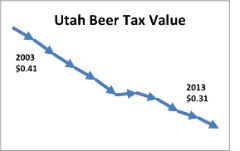Blog
Anti-Government Women's Group Touts Free Speech, Ignores Cost of Harm
 |
Centers for Disease Control and Prevention |
A November 15 Forbes op-ed on alcohol marketing to women is anti-regulation rhetoric of the Independent Women's Forum (IWF), which dismisses the public health perspective on alcohol-related harm and effective alcohol policy. The op-ed wasn't about the amount of harm women experience from alcohol, or how to reduce it. Narrowing the issue to those who are addicted to, or dependent on, the substance fails to address the breadth and cost of harm caused by alcohol and ignores evidence-based policies for reducing such harm.
Alcohol consumption is the third leading cause of preventable death in the U.S., resulting in 80,000 deaths each year from injuries, traffic fatalities, and violence, as well as chronic disease. Taxpayers bear the costs from alcohol-related harm, which includes crime, disease, and injuries. The part of these costs borne directly by federal, state and local governments adds up to $94 billion annually, or $0.80 per drink. Federal, state, and local excise taxes combined add up to only $0.15 per drink, and taxpayers are burdened with the rest. Higher alcohol taxes, when applied to all alcoholic beverages, result in higher prices and reduce excessive consumption, and appropriately place the cost of alcohol-related harm on the producers. Increasing alcohol taxes is the single most effective policy available to reduce alcohol-related harm.
The culture of alcohol mentioned in Forbes was not built in a vacuum--it is a direct outcome of aggressive marketing. In addition to the epidemic of alcohol harm, the industry has created a pandemic of alcohol marketing, strategically and pervasively infusing alcohol advertising and promotion into every aspect of U.S. culture. It’s certainly not limited to TV ads-–we are saturated with celebrity alcohol brands, sports sponsorships, and so-called philanthropic endeavors, among others. Alcohol corporations target the female demographic with harmful messages encouraging them to drink. Underage youth, including young girls, are also disproportionally exposed to alcohol advertising. As a result, those who see more alcohol ads start drinking earlier, drink more, and are more likely to develop problems with alcohol in later life. Alcohol producers should not have free reign to market a harmful product while they are held blameless for its negative outcomes. Public health protections are necessary to mitigate the behavioral norms created by ubiquitous marketing, and to reduce the related harm.
Putting the onus on the drinker to be responsible ignores the fact that alcohol companies produce and market a product that causes staggering health and economic harm, and industry doesn't pay anywhere near the amount that it should. In fact, alcohol producers use “drink responsibly” as a marketing tactic to sell more alcohol. The IWF and its anti-government rhetoric defends and excuses the alcohol industry's role in creating grievous harm to people worldwide. Given the amount and cost of alcohol-related harm, why should taxpayers subsidize the industry whose products hurt them?
South Africa: Cabinet Approves Draft Bill Banning Alcohol Ads
 |
Carling Beer Billboard in South Africa |
In a major step toward improving public health in South Africa, the cabinet has approved the Health Ministry's Control of Marketing of Alcohol Beverages Bill. The bill restricts alcohol advertising and sponsorships, reducing exposure to alcohol advertising and promotion and helping to reduce excessive alcohol consumption, particularly among youth. The alcohol industry is already gearing up for an epic fight against the ban, claiming it will hurt the economy, but alcohol-related deaths and injuries cost the country over R38 billion annually ($3.9 billion in U.S. dollars). South Africa's government has set an important example by putting its people's health and safety ahead of Big Alcohol's bottom line.
Big Alcohol is the Big Beneficiary of CA Legislation in 2013
 |
Alcohol Justice identified a total of 23 bills and resolutions of interest during California’s 2013 Legislative session; a vast majority of which benefitted the alcohol industry. Of the 20 items that AJ opposed 14 ultimately passed. By contrast, of the 3 bills that AJ supported, 2 were signed into law with 1 being vetoed by the governor after passage by the legislature. The remaining bills failed to make it out of the legislature.
Utah Rep. Draxler's Beer Tax Inflation Bill to Fund Prevention Programs
 |
The value of Utah's state beer excise tax has
|
Utah Rep. Jack Draxler (R-North Logan) has proposed to index the state's wholesale beer tax to inflation, using the additional revenue to fund programs to prevent underage and binge drinking. Utah's beer excise tax was last raised in 2003, and its real value has fallen 24% since then. Under Draxler's proposal, the average beer drinker in Utah would pay less than $0.30 more per year, but the tax adjustment would net an additional $530,000 to pay for prevention programs.
The bill needs the support of the Health and Human Services Interim Committee on October 16 in order to move forward.To view a list of representatives on the committee and send a letter of support, click here.
More Articles ...
Help us hold Big Alcohol accountable for the harm its products cause.
| GET ACTION ALERTS AND eNEWS |
STAY CONNECTED    |
CONTACT US 24 Belvedere St. San Rafael, CA 94901 415-456-5692 |
SUPPORT US Terms of Service & Privacy Policy |


